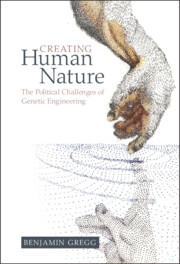Book contents
- Creating Human Nature
- Creating Human Nature
- Copyright page
- Dedication
- Contents
- Acknowledgments
- Introduction
- Part I The Political Bioethics of Regulating Genetic Engineering
- Part II The Political Dimensions of Engineering Intelligence
- 5 Threshold Capacities for Political Participation
- 6 Political Capacity of Human Intelligence and the Challenge of AI
- 7 Political Ambiguity of Personalized Education Informed by the Pupil’s Genome
- Part III Inequality as an Unintended Consequence Locally and as a Planetary Phenomenon
- References
- Index
5 - Threshold Capacities for Political Participation
from Part II - The Political Dimensions of Engineering Intelligence
Published online by Cambridge University Press: 13 October 2022
- Creating Human Nature
- Creating Human Nature
- Copyright page
- Dedication
- Contents
- Acknowledgments
- Introduction
- Part I The Political Bioethics of Regulating Genetic Engineering
- Part II The Political Dimensions of Engineering Intelligence
- 5 Threshold Capacities for Political Participation
- 6 Political Capacity of Human Intelligence and the Challenge of AI
- 7 Political Ambiguity of Personalized Education Informed by the Pupil’s Genome
- Part III Inequality as an Unintended Consequence Locally and as a Planetary Phenomenon
- References
- Index
Summary
In terms of realizing a just society, would the citizen and her political community be significantly advantaged if she and her fellow citizens were of a “threshold level” of intelligence? The question might be formulated in terms of several parameters: (1) A just political community would seek to help as many (future) citizens as (medically, technically) possible to have a cognitive capacity at the threshold level necessary for democratic political participation. (2) Treatment at the fetal stage of development would result in many more future citizens capable of realizing their social, political, and legal status as rightsholders, as stakeholders in their political community. It would prevent what otherwise would be their political exclusion on the basis of cognitive capacity inadequate for full and robust participation. (3) State subsidization of legally entitled engineering (for parents who cannot afford it) would help prevent a maldistribution of access that otherwise would exacerbate existing social inequalities. Further, assume that the following were possible: (a) a biotechnological ability to identify genetically, at the fetal stage of development, severe cognitive disability in the future person; (b) an empirically identifiable, scientifically measurable threshold level of intelligence necessary for democratic political participation (constituting a lower bound for ethically and legally permissible genetic engineering at the fetal stage); (c) genetic technology capable of engineering human intelligence;1 and (d) a legal right to genetic engineering of a future person who, at the fetal stage of development, indicates severe intellectual disability.
- Type
- Chapter
- Information
- Creating Human NatureThe Political Challenges of Genetic Engineering, pp. 103 - 118Publisher: Cambridge University PressPrint publication year: 2022



